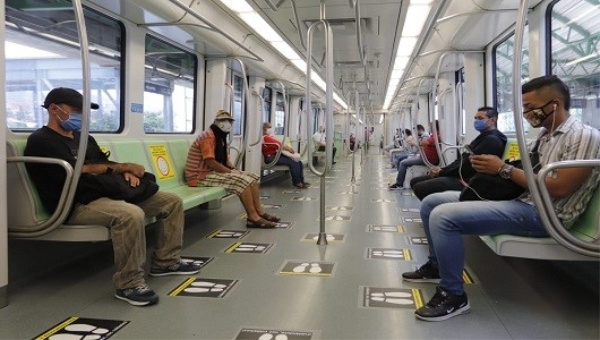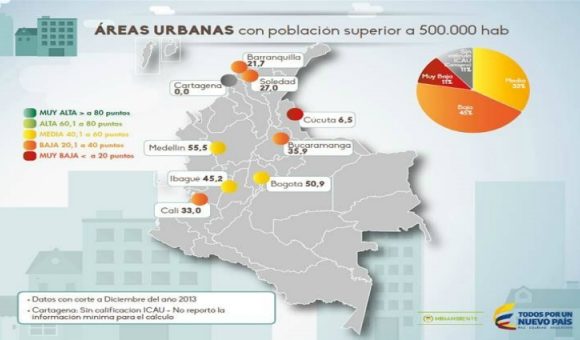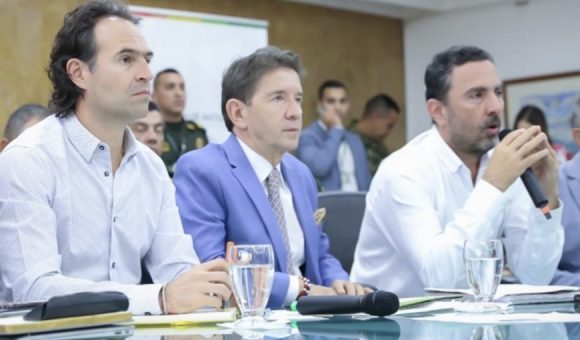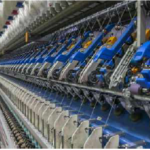Thousands of Manufacturers, Construction Companies Respond to Biosafety Protocols; Medellin, Antioquia Gradually Returning to Work

Medellin Mayor Daniel Quintero revealed April 27 that more than 50,000 metro-area workers in manufacturing and construction already have returned to work — following a pioneering business/worker registration system for addressing the Coronavirus quarantine crisis.
Passengers on the Medellín “Metro” train, bus, tram and cable-car system increased by 10% on April 27 — more-than-complying with the national government’s 35% limit on public transit capacity during the Coronavirus crisis, he added.
The successful, partial restart of the local economy here came about “thanks to the measures implemented by the municipal administration in conjunction with other authorities to safeguard the lives of the more than 50,000 workers who today went out to resume their work — and joined the 350,000 who since the beginning of the quarantine carried out their work with rigorous control,” according to the Mayor.
Companies that registered themselves and their workers on the new “Medellín Me Cuida” computerized platform “allows us to have a complete trace of where [workers] are, to which companies they are going, and in the event of any problem, we can [take preventive action] upon those companies or persons,” Mayor Quintero added.
More company and worker registrations will continue on the “Medellín Me Cuida” platform – not only for manufacturing and construction sectors, but also for other quarantine-exempt sectors including food and health, Quintero added.
Biosafety Protocol Measures
On a parallel front, Colombia’s Health Ministry highlighted new biosafety protocols for manufacturers that took effect April 27.
Under these protocols, reception areas at manufacturing companies must include “physical barriers in the area of receipt of invoices and correspondence” such as “a window that separates the person receiving from those who have correspondence,” according to the Ministry.
“It is important to guarantee the use of latex, nitrile or vinyl face masks and gloves, so that between the receptionist and the messenger the exposure is reduced, as well as having 60% glycerinated alcohol available at the reception in case the person who goes to the reception area does not have gloves, and inform the person who arrives that they must sanitize their hands first,” according to the new protocol.
“The disinfection of packages or items that are received is a key element, as well as the physical distance between workers. So, the location of [manufacturing] machines must be adjusted to ensure two meters of distance between workers in each department.
“In addition, machine operators must properly wear conventional face masks at all times and perform the hand-washing protocol on a regular basis — at least every three hours — and must not share the equipment with another worker.
“Cleaning the machines is another factor to keep in mind, as well as ventilating and keeping the material or supplies storage areas in hygienic conditions.
“For operating personnel, the guideline indicates the use of the respiratory, visual and hand protection (gloves) as defined in the Occupational Health and Safety Management System, according to the risk and the machinery used. As for work clothes within companies and factories, these must be changed upon entering and prior to departure for other clothing.
“Transport vehicles must be fully disinfected and the driver must have at least 60% glycerinated alcohol for frequent use in the vehicle cabin. It is recommended to stop using air conditioning in the vehicle and opt for natural ventilation, by keeping the windows open.
“Routine temperature taking [of workers] should be performed at the entrance and exit of the shift, at the beginning of the working day and at the end of it (or at least two times per shift) and each company must designate a person responsible for coordinating the implementation and verification of the protocol. In the event of a temperature detection of 38ºC or more, the worker must be sent immediately to your EPS [health provider network].”
As for interaction with clients and suppliers, “if there is a space for sale to the public, [then] interaction with customers should be contactless, leaving and picking up the products in a delivery area and keeping the minimum separation distance of two meters.
“As far as possible, the recommendation is to keep a supplier and customer identification record to serve as a reference in the event that a worker is diagnosed positive for Covid-19, so that contacts can be traced.
“Regarding the workers’ shifts, the employer must agree on them in such a way that they are aligned with the biosafety recommendations. Active breaks and cleaning every hour are necessary, [along with] avoiding crowds in common areas, bathrooms and hand washing areas,” according to the new protocols.
Colombia’s Minister of Commerce, Industry and Tourism (MinCIT) Jose Manuel Restrepo added that to date, 20% of Colombia’s 96,000 manufacturing enterprises had already registered and begun implementing biosafety protocols — as required by new regulations.
Intelligence, Information, Cooperation — Not Demagoguery
Meanwhile, at a Colombia-America Chamber of Commerce (Amcham Colombia) “virtual” meeting April 28, President Ivan Duque praised the new biosafety protocols and other Coronavirus crisis-response measures undertaken by the private sector along with national, regional and local governments.
Duque stated that decisions for confronting Coronavirus crisis should be based on intelligence and cooperation, rather than demagoguery by those who “want to generate antagonism between social groups or delegitimize the voices and responsibilities of each other.”
Amcham Colombia executive director María Claudia Lacouture added that the groups’ member companies “want to recognize and thank you for the efforts of the national government to combat this pandemic in a responsible, timely and efficient manner.
“This effort has been accompanied by an extraordinary willingness of your cabinet and government officials to provide timely and adequate information,” including rapid responses to business-sector questions and concerns, via internet-virtual meetings, Lacouture told President Duque.
















